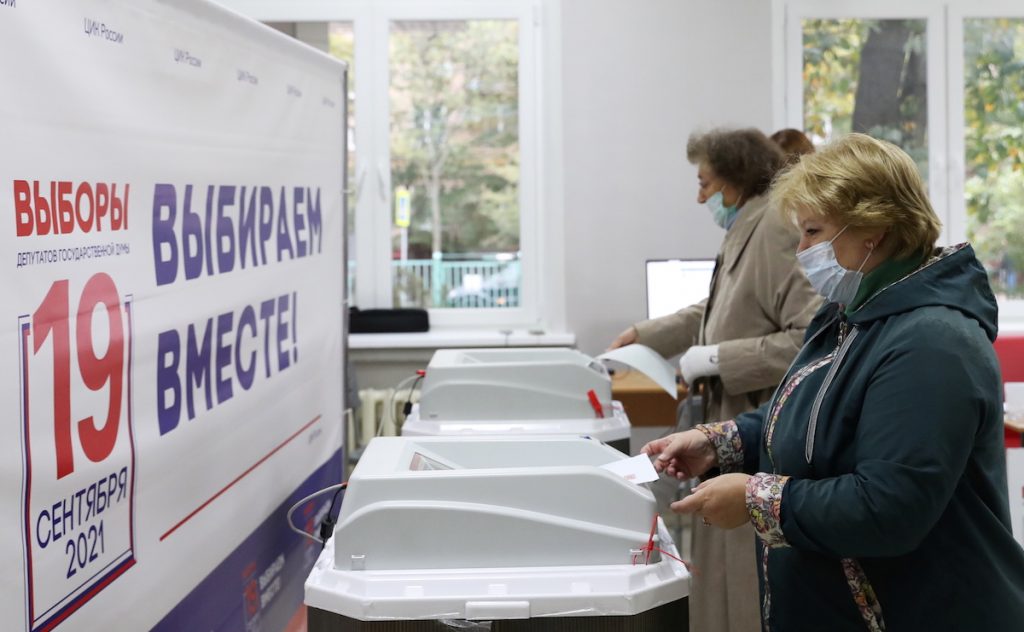Elections in Russia: Putin's party wins, Google and Apple against Russian opposition
Putin’s party wins elections in Russia
As expected, the ruling party, United Russia, won the elections to the State Duma of Russia. According to preliminary results, four more parties will be represented in the Duma. Before the elections, the Russian authorities tried to restrict citizens’ access to information on the Internet, and in this they were helped by the world giants Google and Apple.
Three-day parliamentary elections have ended in Russia. According to the preliminary results issued by the Russian Central Election Commission, on the morning of September 20, the ruling party gained about 48% of the vote. The Communist Party (KPRF) with 20%, the Liberal Democratic Party (LDPR) with 7.6%, and A Just Russia with 7.4%, are elected to the Duma.
- Putin and Biden discuss Navalny, Ukraine, cybersecurity in Geneva
- Nationalists, crown-skeptics and ‘yellow vests’ – RT’s broadcast in Europe
In addition to the “traditional” parliamentary parties, the recently created New People party, founded by businessman Alexei Nechaev, can also enter the Duma. As a result of processing 70% of the votes, the party received about 5.5%.
At the same time, Telegram channels publish the results of “unofficial exit polls”, according to which in the new State Duma United Russia receives 47%, the Communist Party of the Russian Federation – 19%. And beside them, the “Communists of Russia” and the “Party of Pensioners”, as well as the Liberal Democratic Party, “New People”, “Fair Russia” and “Yabloko” also get into parliament.
The elections were carried out according to a mixed electoral system: according to party lists (225 deputies) and single-mandate constituencies (225 deputies).
Google and Apple against the Russian opposition
These elections to the State Duma became unprecedented not by their results or by the course of voting, but by the fact that before them the state, for the first time, managed to significantly limit citizens’ access to information on the Internet.
According to the Russian “Novaya Gazeta”, on the night of September 16, a “historic for the Russian Internet” event took place: large providers began to block Google Docs, a key document management tool used by millions of people in modern businesses – from marketing to education.
Google’s fault was that it was on this platform that supporters of the leader of the Russian opposition, Alexei Navalny, published a list of “Smart Voting” – recommendations for a consolidated protest expression of the will of citizens.
The goal of “Smart Voting”, developed by Navalny’s supporters back in 2019, was to mobilize “protest votes” in favor of opposition candidates who have the greatest chances of winning. Moreover, it is not necessary for this candidate to support the views of the democratic opposition.
The main goal was to destroy the monopoly on power of United Russia. Even if it is defeated by representatives of the so-called. “Systemic opposition”, which the authorities allow before the elections.
Navalny himself, who is currently serving his term in prison, as well as his supporters, cannot participate in elections and political life. They are not registered as a party, and organizations associated with Navalny have been declared extremist and banned.

Therefore, Smart Voting experts determine the most desirable candidate from other parties in a particular region, who is able to defeat the ruling party, and urge voters to vote for him.
The most controversial and most painful decision for the Russian opposition was the removal by global giants Google and Apple of the Navalny application from Google Play and the App Store.
Companion of Alexei Navalny, Ivan Zhdanov, published an explanation from Apple. The company says that the reason for blocking the application was the recognition of the Navalny Anti-Corruption Fund as an extremist organization. According to Russian authorities, the app contains “content banned in Russia” and “allows you to interfere with elections,” the company said.
Stuffing, carousels, new passports
Opposition and observers report many irregularities during the three-day voting process including repeated voting – the so-called carousels, signs of coercion to vote, ballot stuffing, obstruction of observers’ work, and refusal to address complaints.
The “Caucasian Knot” publication reports about 200 people who were brought on the first day of elections to vote from the Ukrainian Donbas to Krasny Sulin in the Rostov region. Many of them were given their passports right before the vote.
A camera at a polling station in Kemerovo recorded ballot stuffing – a woman is trying to block her hand from the camera, while throwing a stack of sheets into the ballot box.
В Кемерово наблюдатели от «Яблока» вновь зафиксировали вбросы на УИК 237: женщина пытается загородить от камеры руку, которая появлятся из российского флага и кидает в урну стопку бюллетеней pic.twitter.com/AARrhAMOa0
— Новая Газета (@novaya_gazeta) September 18, 2021
Putin’s vote
September 17 video appeared of President Vladimir Putin voting online. A few days before the elections, the Kremlin announced that the president is in self-isolation, as there are many coronavirus patients around him.
Как голосовал Путин
— Новая Газета (@novaya_gazeta) September 17, 2021
Видео: RIA KREMLIN POOL https://t.co/uGPT3rp3BI pic.twitter.com/5sVcNH1Kux
The footage of Putin’s voting confused social media users. For example, the video missed the moment of the required authentication via SMS. And since the president has publicly stated that he does not have a mobile phone, it means that he could hardly have received a confirmation code for his personal number. The Kremlin tried to explain this discrepancy of facts by the fact that Putin used his assistant’s phone.
In addition, the recording shows the President’s watch Blancpain Leman Grande Date: the calendar at the bottom of the dial shows the number 10. This video was published on the first day of voting, September 17. The president could not vote on September 10 – early online voting is not provided for this year.
The presidential spokesman explained the incorrect date on the clock by the fact that Putin does not use this function.



















